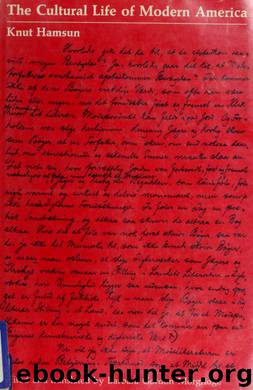The Cultural Life of Modenr America by unknow

Author:unknow
Language: eng
Format: epub
Tags: United States -- Intellectual life, United States -- Foreign public opinion, Norwegian
Publisher: Cambridge, Mass., Harvard University Press
Published: 1969-10-15T05:00:00+00:00
Writing and Writers
75
of originality. Whenever he comes close to divine territory, he develops Asiatic fits and it is goodbye to all of the theories he has propounded earlier. “The inviolate soul is in perpetual telegraphic communication with the source of events,” he says. He expresses it even more clearly when he says, “The central fact is the superhuman intelligence pouring into us from its unknown fountain, to be received with religious awe, and defended from any mixture with our will.” Then what is the use of all those “thousands of workers”? When the inviolate soul is pinched for information of one kind or another or an answer to some question, it does not even look the information up in Plato; “as a matter of fact,” Emerson says, it comes to us firsthand from that unknown fountain, like a telegram. You feel wet just reading about this fountain that is supposed to pour into us. And if Emerson himself is afraid that the telegram might not materialize, he allows the Unitarian in him to add: “Verily we have no questions to ask which are unanswerable.” Now, verily, this is a rather peculiar assertion from the mouth of a philosopher. Confronted with the most staggering enigmas, he stands still, fails to come up with anything, relaxes, and then bursts forth with the Psalmist. As for the immortality of the soul, Emerson then proves this with a line from Emerson: “If my bark sink, Tis to another sea.” In addition, he needlessly cites a couple of lines from Fox’s views on eternity: And there is “an ocean of darkness and death; but withal an infinite ocean of light and love which flowed over that of darkness and death.” Therefore the soul is immortal . 43
With such ethical and philosophical trifles as these, Emerson has become a philosopher. These are his teachings: a soul in the body, a God on the horizon. What he asks of the philosophers is “wisdom,” which he also interprets as “ethics.” Plato’s wisdom is boundless, Behmen’s is “healthy and beautiful,” Swedenborg’s he finds “pleasant,” Montaigne’s “immoral,” Shakespeare’s “unbelievable”—in short, he asks what kind of wisdom it is and what it consists of. As if a serious philosophy were contingent on a specific morality! There are people who can as readily imagine a philosophy of vice as of virtue. Emerson’s moral philosophy is just what you find in the homily collections of every Unitarian household (see the collec-
Download
This site does not store any files on its server. We only index and link to content provided by other sites. Please contact the content providers to delete copyright contents if any and email us, we'll remove relevant links or contents immediately.
The Hynek UFO Report by J. Allen Hynek(356)
The Cultural Life of Modenr America by unknow(306)
Nicki Minaj: HIP POP MOMENTS 4 LIFE by ISOUL HARRIS(214)
Can the Left Learn to Meme? : Adorno, Video Gaming, and Stranger Things (9781785357244) by Watson Mike(131)
